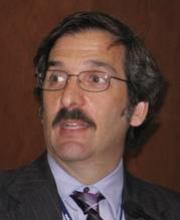RALEIGH, N.C. – A population-based total-body skin cancer screening program reduces melanoma mortality, according to the results of a landmark German project presented at the annual meeting of the Society for Investigative Dermatology.
"I would argue that this is the most important presentation anywhere at this meeting," Dr. Martin A. Weinstock said during his presentation of the SCREEN (Skin Cancer Research to Provide Evidence for Effectiveness of Screening in Northern Germany) project.
"The reason I make that argument is very simply because melanoma accounts for more deaths than anything else in the dermatology world. If we want to reduce that number of deaths, the best way is [through] early detection – and SCREEN provides the best evidence to date that we can do that," explained Dr. Weinstock, professor of dermatology and epidemiology at Brown University, Providence, R.I., and a SCREEN project organizer.
SCREEN was a population-based skin cancer screening program in which all residents over age 20 in the German federal state of Schleswig-Holstein were encouraged to undergo a standardized whole-body skin examination between July 2003 and June 2004. Nineteen percent of the state’s eligible population – 360,288 individuals – participated. Half of the 1,169 melanomas diagnosed in Schleswig-Holstein during the study period were detected via the SCREEN program.
Before the skin cancer screening period (1998-1999), the melanoma mortality rate was 1.9 per 100,000 men and 1.4 per 100,000 women. The key study finding was that melanoma mortality fell by 48% in Schleswig-Holstein by 2008-2009 to 1.0 per 100,000 men to 0.7 per 100,000 women.
Nothing parallel occurred in the rest of Germany, or in Schleswig-Holstein’s neighbor to the north, Denmark.
The observed melanoma mortality rate in Schleswig-Holstein during 2008-2009 was 1.0 per 100,000 for men and 0.7 per 100,000 for women, compared with 1.8 and 1.2, respectively, in Germany as a whole excluding Schleswig-Holstein.
During 2000-2009, the most recent 10-year period for which official German mortality statistics are available, melanoma mortality in Schleswig-Holstein declined by 7.4% annually. In contrast, melanoma mortality rates were stable over time in each of the four adjacent states to the north, south, east, and west, none of which had a skin cancer screening program.
A bump in the incidence of melanoma was recorded in Schleswig-Holstein during the screening year, but not elsewhere, according to Dr. Weinstock.
The standardized total-body skin examinations were performed by physicians, who had to complete an 8-hour, day-long training course in order to participate. Of note, 116 of the 118 dermatologists practicing in Schleswig-Holstein participated in SCREEN, as did 64% of primary care physicians. Physicians were paid to perform the screens, and the public was encouraged to undergo screening via an extensive multimedia campaign.
The screening had a two-tiered structure. More than three-quarters of individuals were initially screened by primary care physicians. Participants with suspicious findings were sent to a dermatologist, who performed a second whole-body skin examination and performed biopsies as warranted.
Total-body skin examination as a means of reducing melanoma mortality has long been a controversial issue. The U.S. Preventive Services Task Force has recommended that there is not enough evidence to recommend screening the general adult population (Ann. Intern. Med. 2009;150:188-93). However, according to Dr. Weinstock, the recommendation will need to be revisited in light of the new evidence from Germany.
He observed that although SCREEN was an observational study, and, hence, doesn’t constitute absolute proof that a skin cancer screening program saves lives, it was the most ambitious effort to screen for melanoma ever conducted anywhere in the world. And it provides what is probably the strongest evidence that will ever be available, in his view, given the great expense and many years of follow-up required for a randomized controlled trial of skin cancer screening.
As he and his coauthors wrote in a new report from the SCREEN project, "In the public health arena, absolute proof is not necessarily required when lives are at stake" (Cancer 2012 April 19 [doi: 10.1002/cncr.27566]).
German dermatologists, flush with the SCREEN success, had proposed to follow-up the project with a definitive randomized controlled trial of melanoma screening, but were overruled. Federal health officials found the SCREEN results so persuasive that they launched an ongoing national skin cancer screening program. All 45 million Germans aged 35 years and older are now eligible for a total-body skin examination every 2 years.
The SCREEN investigators ruled out improvements in melanoma therapy as a potential explanation for the observed reduction in mortality, since there were none during the study years. Nor were there any changes in coding practices in the Schleswig-Holstein statistics office. And no major melanoma primary prevention programs were introduced.


